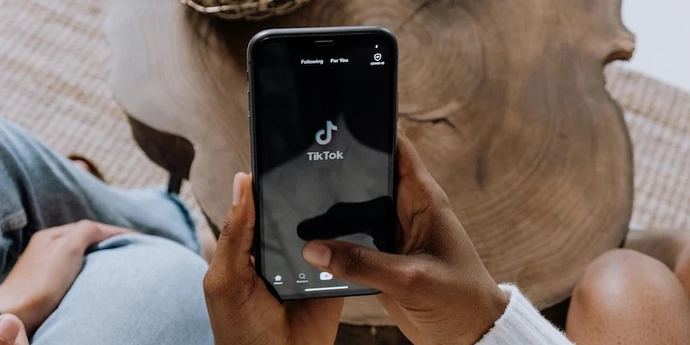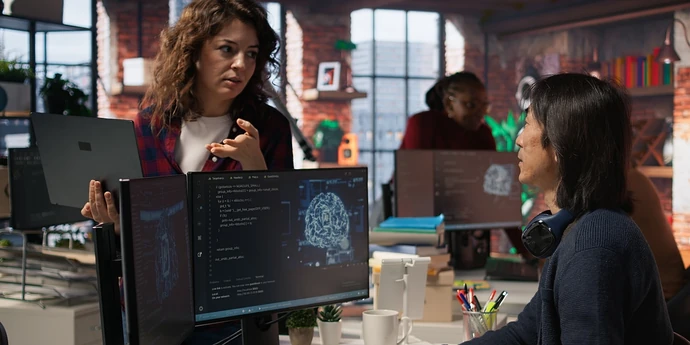In this guide, we’re going to cover everything you need to know to prepare for product manager interviews at Google.
We’ve gathered insights from ex-Google PM interviewers on our platform, successful candidates we've worked with, hundreds of reports from Google candidates on Glassdoor, as well as information from official Google sources, in order to put together this guide.
Below you’ll find a detailed overview of the interview process, example questions, how to answer, and a preparation plan.
Here's an outline of what we'll cover:
- Role and salary
- Interview process and timeline
- Example interview questions
- Interviewing tips
- Preparation plan
Click here to practice with Google PM ex-interviewers
1. Google product manager role and salary ↑
Before we cover your PM interviews at Google, let's take a quick look at the role itself (alternatively, feel free to skip straight to the sections on the interview process or interview questions).
1.1 What does a Google product manager do?
The product manager position at Google stands out from PM roles at other FAANG companies in three key ways:
- Strong engineering culture. Compared to Meta and other companies which tend to be more product-centric, Google places great emphasis on its engineering culture. As a result, Google PMs tend to have a strong technical background, allowing them to effectively sell their vision to the engineering team.
- Focus on longer-term, more qualitative goals. Rather than judging results on strict metric gains, Google often gives PMs space to make more foundational changes that might not deliver immediate results.
- Bottom-up decision making. Google adopts a bottom-up decision-making strategy, empowering PMs to act as product CEOs. This makes it easier to make decisions and to implement innovative ideas quickly.
Why is Google a great place to build a PM career? According to ex-Google senior PM Mark R., being a PM at Google taught him how important it is to question how products contribute to society and to be a thoughtful steward.
Furthermore, if you’re looking for a challenge, working with Google software engineers will push you to come up with creative, customer-focused solutions.
If you want to see more firsthand insights into how Google product managers see their role, check out this video by Life at Google.
What does Google look for in a product manager?
Based on the most recent Google PM job listings, here are the top skills Google looks for in a product manager:
- Technical depth. Google wants PMs to have experience working with engineers and an excellent understanding of technical concepts.
- Product-lifecycle ownership. While you don't need to have end-to-end product lifecycle experience, you must demonstrate the ability to define product vision, strategy, and roadmap.
- Cross-functional collaboration and communication. A core skill across all PM roles. A Google PM needs to be able to work and communicate across multiple functions, build relationships with stakeholders, and influence even without authority.
- User empathy. As a Google PM, you need to show a deep understanding of the user experience and an ability to translate user needs into product requirements.
- Data-driven decision making. You should have experience with using data, metrics, and experimentation to guide decisions, and demonstrate proficiency with tools for data analysis and validation
- Thrive in ambiguity. You should show that you're eager to learn and adapt quickly in a fast-paced and often ambiguous environment
Many recently posted roles also emphasize domain-specific knowledge, in particular, AI/ML and infrastructure experience.
1.2 How much does a Google product manager make?
Google PMs make 56% more than other PMs in the US on average, according to Glassdoor.
Compensation mainly depends on two key factors: location and level.
Location: Salaries are adjusted for cost-of-living. For example, Google PMs in the US make 28% more than their counterparts in India.
Level: Both base salary and total compensation go up with each PM level. Google offers some of the most competitive offers for mid-level and executive-level PMs, according to Levels.fyi data as of early 2026.
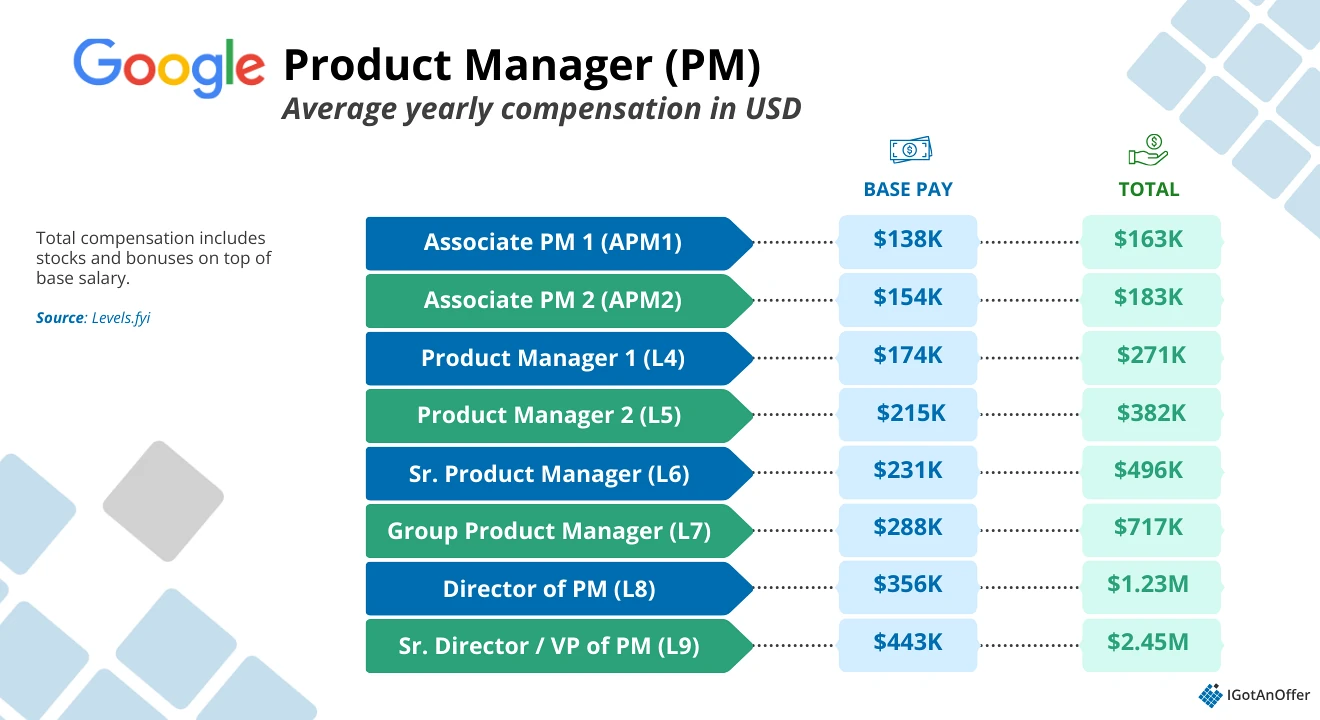
If you’re unsure what level you’re being considered for, ask your recruiter.
Ultimately, how you do in your interviews will determine what level you’re offered. That’s why hiring one of our Google PM interview coaches can provide such a significant return on investment.
And remember, compensation packages are always negotiable, even at Google. So if you do get an offer, don’t be afraid to ask for more.
For tips on how to negotiate well, check out our Google offer negotiation guide and PM salary negotiation guide. Then, consider booking a salary negotiation coaching session with one of our experts to practice what you’ve learned.
1.3 What is the hierarchy for product managers at Google?
Google follows a structured hierarchy for its product manager position.
Entry-level:
- Associate PM 1 (APM 1)
- Associate PM 2 (APM 2)
Mid-level:
- PM 1 (L4)
- PM 2 (L5)
Senior:
- Senior PM (L6)
- Group PM (L7)
- Director PM (L8)
As you level up, you’ll obviously get a jump in compensation and responsibilities.
Furthermore, the level of ambiguity you’ll be trusted to handle also goes up. This means you’ll have to define the problems worth solving within the company (instead of having someone higher up hand them down to you) and lead the entire initiative from strategy to execution.
1.4 What is the acceptance rate for Google product managers?
As you might expect from a company as big as Google, the acceptance rate is very low. The oft-cited figure is less than 1%.
As an example, Google’s associate product manager (APM) internship program, geared towards new graduates, receives an estimated 8,000 applications per year. Only 40 to 45 candidates receive an offer. That’s .56% of the estimated number of applications.
And out of those candidates, only 35 will be converted into full-time APMs.
At this point, you might be wondering what your chances are. The good news is, regardless of the hiring trend, Google is such a large company that it's always hiring, if only to replace the people who are leaving.
We estimate that Google hires roughly 1,000 to 1,500 new PMs per year. The number may have dipped in 2023, but it seems to be picking up again in 2025.
Here are the steps we took to get to these estimates if you are interested in more details:
-
Number of employees: Google reports its number of employees every year in its annual report.
-
Number of engineers: At the time of writing, 40% of job ads for Google are for engineering positions. For each year, we therefore multiplied the number of employees by 40% to get to the number of engineers.
-
Number of PMs: The typical ratio of PMs to engineers at tech companies is between one to eight and one to ten. We've assumed one to eight here to convert the number of engineers into a number of PMs.
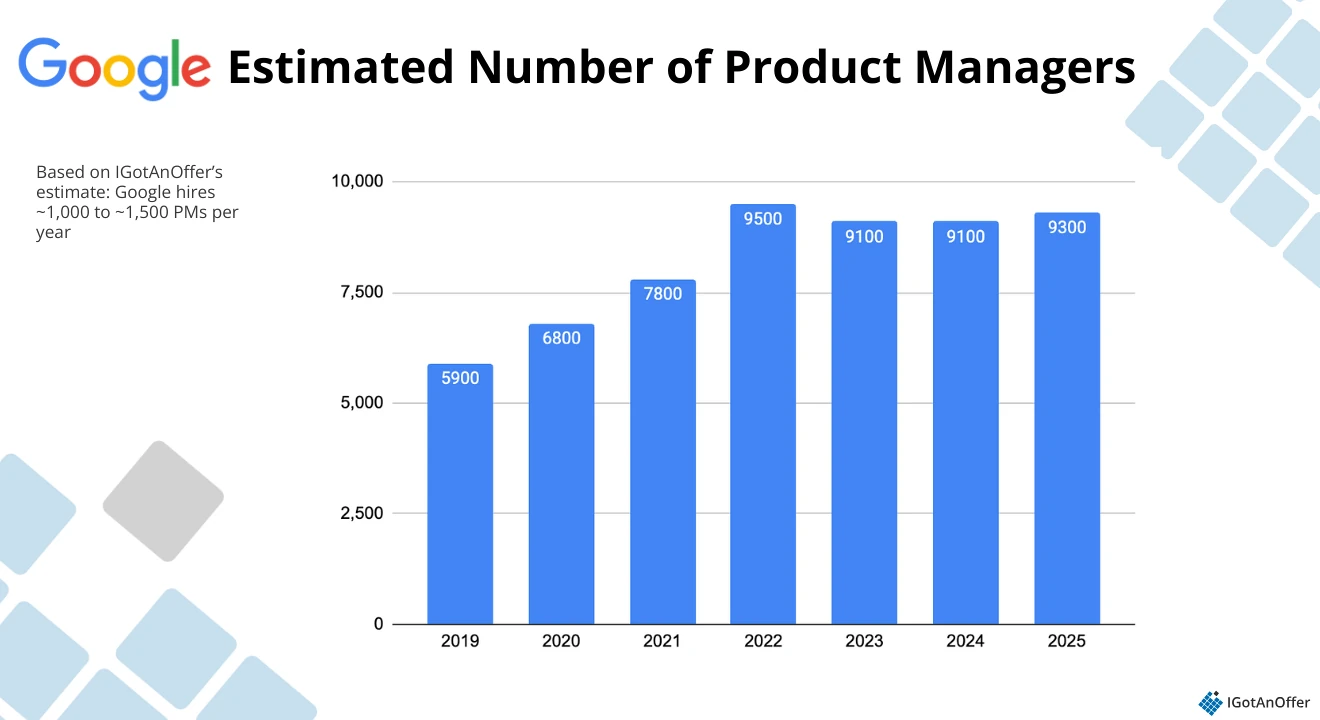 Of course, becoming one of those hires isn't easy: Google hires less than 1% of applicants and is therefore one of the toughest employers to break into in the world. Interestingly, this number grows to 5% if you are referred by a current employee.
Of course, becoming one of those hires isn't easy: Google hires less than 1% of applicants and is therefore one of the toughest employers to break into in the world. Interestingly, this number grows to 5% if you are referred by a current employee.
However, the good news is that cracking PM interviews is actually very manageable once you know what to prepare for. So let's take a look at the different types of questions Google will ask you once you successfully score an interview.
2. Google product manager interview process and timeline ↑
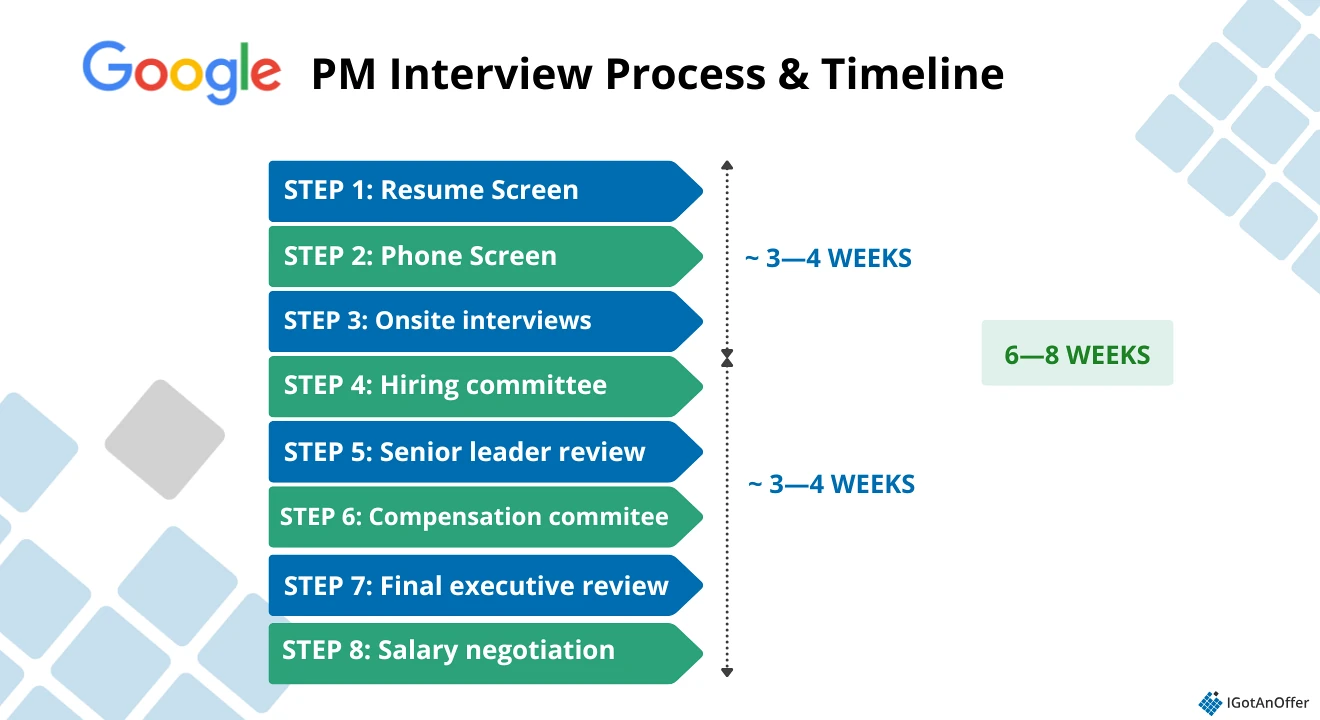
What's the interview process and timeline at Google for the PM role? The process takes four to eight weeks on average and follows the steps below. Note that the process at Google Cloud Platform (GCP) follows a similar process.
- Resume, cover letter, referrals
- Phone screens (one to two interviews)
- On-site interviews (four to six interviews)
- Hiring committee recommendation
- Senior leader review
- Compensation committee recommendation
- Senior executive review
- You get an offer!
Note that these steps are similar, but not identical, to the process for Google APM interviews.
If you are interviewing for a product leadership position (VP, Director, Group PM), check out our product leader interview guide to learn more about the process and how to prepare.
2.1 Steps to expect
2.1.1 Resume screen
First, recruiters will look at your resume and assess if your experience matches the open position.
This is the most competitive step in the process—we’ve found that ~90% of candidates don’t make it past this stage.
You can use our product manager resume guide to help tailor your resume to the position you’re targeting. Or, check out our Google resume guide to see more successful resume examples.
For expert feedback, get input from our team of ex-Google recruiters, who will cover what achievements to focus on (or ignore), how to fine-tune your bullet points, and more.
2.1.2 Phone screens
Next, the phone screens last about 30 minutes and are typically carried out first by a recruiter and then by one or two PMs.
The aim of the call is to check that you meet the basic requirements for the position and stand a chance of getting hired.
Recruiters tend to ask more behavioral and resume questions, while PMs tend to jump straight into product design, estimation, and strategy questions (more on that below).
If Google is really excited about your profile, they might send you on-site straight away and skip this screening step.
2.1.3 Onsite interviews
If you’ve successfully passed the phone screening, you’ll advance to onsite interviews.
Onsite interviews are the real test. Over the course of one day, you may get four to six interviews that last 30 to 45 minutes each.
The interviews may take place at a Google HQ or online via Google Meet. If it’s onsite, one of your sessions may be over lunch with a Google PM where you can ask questions. Google won't be evaluating you during this time, but we recommend that you behave as if they were.
Most of the interviewers you meet will be product managers. Occasionally, you might also interview with an engineer who will assess your technical skills and ability to communicate with developers. If you're interviewing for an AI-focused PM role, you might also get a session with an ML engineer or applied scientist.
The interviews are very structured. Each of your interviewers will evaluate you on four main attributes (role-related knowledge, general cognitive ability, leadership and Googleyness), take copious notes, and then file a detailed report.
2.2 What happens behind the scenes
If things go well at your on-site interviews, here is what the final steps of the process look like:
- Interviewers submit feedback. After your onsite interviews, your interviewers will all submit their feedback and grade your answers to their questions.
- Hiring committee recommendation. Their feedback will then be submitted to a hiring committee that will review the feedback along with your resume, internal referrals, and any past work you have submitted. Based on these, the committee should make a recommendation on whether Google should hire you or not.
- Senior leader review. The hiring committee's recommendation will then be reviewed and validated by a senior manager.
- Compensation committee recommendation. Once validated by a senior leader, your candidate packet will be sent to a compensation committee, which will decide how much money you’ll be offered.
- Final executive review. Finally, a senior Google executive will review a summary of your candidacy and compensation before the offer is sent to you.
- You get an offer!
As you've probably gathered by now, Google goes to great lengths to avoid hiring the wrong candidates. This hiring process with multiple levels of validations helps them scale their teams while maintaining a high caliber of employees. But it also means that the typical process lasts four to eight weeks and sometimes much more.
3. Google product manager example interview questions↑
The main difficulty with PM interviews at Google is that you will be asked a wide range of questions.
To help you with your prep, we gathered questions from reports by former candidates on Glassdoor. We’ve updated the list with even more questions in July 2025.
To organize your prep, we've grouped these questions into five categories.
Let's step through each type of question, take a look at a few examples, and briefly discuss why Google asks these questions. We’ve linked to some high-quality mock interview videos for some questions, so be sure to check those out.
Note that we have edited some questions for language and clarity.
3.1 Product insight interview questions
As a Google product manager, you need to have the ability to consider user experiences from the customer’s perspective and use that point of view to design and improve products.
You should then be able to convey a clearly defined product vision to stakeholders and follow through on it.
Interviewers test these capabilities using product insight questions. In this portion of the interview, you will be expected to combine your understanding of the product space with technical and business considerations.
We divided the product insight questions below into three categories: product design, product improvement, and favorite product.
Example product design questions asked at Google PM interviews
Product design
- Design an app for an amusement park.
- Create a social travel app with a twist
- Design something for Google Meet
- Design a camera for the elderly
- Design a product for travel
- Design a product to find a doctor
- Design a new product to compete with a technical product you love
- Design an experience for people who are booking flights and are traveling for the first time
- How would you design an airport?
- What would you design if you were the PM of Google Flights and the strategy had to be monetized?
- How would you go about designing a solution to organizing a party with friends?
Product improvement
- How would you improve Google Chrome?
- How would you improve Google Calendar for remote teams?
- Which Google product will you improve, and which will you cancel?
- How would you improve our flying experience?
- How would you improve a Google product you frequently use?
- Choose a phone app that you use daily and identify 3 features you would improve or build from scratch
- Imagine a world where everyone has a smartwatch. What will you do to improve user experience?
Favorite product
- What is your favorite product and why? How would you improve it?
- What is your least favorite Google product? How would you improve it?
To dive more deeply into these topics, we recommend reading our guides to product design, product improvement, and favorite product interview questions.
3.2 Analytical interview questions
At Google, product managers understand the challenges that a product faces, absorb relevant information, and develop data-based conclusions on how to address them. This requires working with numbers to break down problems.
Interviewers will test whether you’re able to do this using analytical questions. You’ll be tasked with estimating key market information and defining distinct metrics to measure success and failure.
To ace this interview category, you need to demonstrate your thinking process and give a final solution with clear and well-structured responses.
We’ve divided the questions below into two categories: estimation and metrics.
Example analytical questions asked at Google PM interviews
Estimation
- Estimate the time spent at stop lights each year
- How many planes can take off from an airport in an hour?
- How many lights are on in San Francisco at 8pm on an average day?
- How many messages per second does Gmail receive?
- What is your favorite restaurant? Estimate how much money they make in a year.
- How much did taxi rides increase or decrease worldwide during COVID-19?
- Estimate the number of street lamps in New York City
- Estimate the market size for vintage watches
- How many self-driving cars would be needed to transport every person in London?
Metrics
- Imagine you're PM of YouTube Analytics. What are your 3 key metrics?
- What metrics would you set for YouTube in a developing country?
- What are the key metrics for an API in a cloud?
- Select a product and choose the metrics that you would use to measure its success.
- Asana made a new ticketing system—how would you measure its success?
- How would you measure metrics for BART (i.e., Bay Area Rapid Transit)?
- What metrics are important for Google Docs?
- You notice a 30% change in usage of your product. What would you do?
- As a PM in Gmail, you come in on Monday, take a quick look at the metrics dashboard, and see that received emails have dropped 15% last weekend over the weekend(s) before. What do you do?
These two subcategories require individualized frameworks. We recommend reading our guides on how to answer each type: how to answer estimation questions and how to answer metric questions.
3.3 Behavioral interview questions
In order to get things done at Google, employees must work in cross-functional teams and display emergent leadership.
This requires effectively addressing difficult questions, handling pushback, thriving in ambiguity, and challenging the status quo when necessary.
To assess whether you can do these things, Google interviewers use behavioral questions targeting Googleyness, leadership, and cross-functional collaboration skills.
According to Christian (ex-Google large customer sales manager), “Googleyness questions often focus on how you would react to certain situations, based on your values and attitudes." These values should also cover the way you lead and influence others.
Cross-functional collaboration focuses on how well you can maintain a professional demeanor in high-pressure situations that require buy-in from a diverse range of stakeholders.
Let’s take a look at some sample questions.
Example behavioral questions asked at Google PM interviews
General
- Why do you want to work at Google?
- Why product management?
- Why are you leaving your present company?
- Why should we hire you?
- How do you handle stress or tight deadlines?
- What is your approach to work-life balance?
- What makes you unique?
- What are your career goals?
- What are you looking for in your next role?
- What is one accomplishment you're most proud of, at work or outside of work?
- Tell us about a time you faced conflict.
- Tell me about your previous experience
- Describe a product that you built
Googleyness and leadership
- Explain your project management philosophy
- Tell me about a time you used data to make a decision
- Tell me about a time you resolved a problem as a Product Manager
- Tell me about a time you led a team
- Tell me about a time you set and achieved a goal
- What would happen if Google fired all of its PMs tomorrow?
- Describe a project you managed from start to finish, including any project management tools and communication tactics you used to keep stakeholders involved
- How do you handle challenges with meeting deadlines?
Cross-functional collaboration
- Tell us about a time you disagreed with the team
- How do you collaborate with others?
- Who are your closest allies on your team?
- Describe a time when you had a cross-functional challenge on a project. How did you manage it?
- Tell me about a time when you were able to create a win-win situation
- Describe how you would convince engineering to work on a business-requested feature that would interfere with their existing work, especially if the engineering team is working on meeting a deadline
- How do you resolve conflicting product requirements? What or who determines which requirement takes the hit?
- How would you manage through a latent field failure or bug that is directly impacting customers and driving return rates up or support contacts?
- Your largest customer is loudly advocating for a new feature that is not in your prioritized roadmap. Sales, eager to please, have gone straight to Engineering to see if they can drop everything and get this done. What do you do?
- What would you do when you have already committed to a release but your engineering team tells you it can’t be shipped in the given time?
To learn a repeatable answer framework for answering Google behavioral questions, read our guide to Google behavioral interviews.
Then practice using even more sample questions from our Googleyness and leadership interview guide.
3.4 Strategic insight interview questions
Google product managers establish and adapt strategies by understanding the customer, the competition, external trends, and data from tracking metrics.
To qualify, you need to show that you can set a product vision and build the roadmap to deliver it.
With strategic insight interview questions, interviewers assess if you're comfortable thinking about the wide range of aspects good PMs need to take into account when making product decisions. This includes competition, pricing, marketing, time to market, etc.
Let’s take a look at some sample questions.
Example strategic insight questions asked at Google PM interviews
- Imagine you’re the CEO of Uber. What would your 10-year strategy be?
- How would you go about mapping an unmapped area?
- How would you double YouTube’s user base?
- Imagine you’re a PM in Google’s consumer hardware organization. What would you build next?
- How do you see the "creator economy" evolving over the next ten years? If Google wanted to make a new major product investment within this space, what would you recommend we build?
- Pretend Google wants to acquire iRobot. What do you look for, and how would you position yourself?
- How would you revolutionize the car wash industry?
- How would you monetize [a certain product] more effectively?
Thinking through all these aspects requires creativity and a structured approach. To learn how you can do this, check out our guide on how to answer strategy interview questions.
3.5 Craft and execution interview questions
In addition to gathering the right insights, setting the perfect strategy, analyzing the data, and making a plan, Google product managers must be able to execute what they’ve planned.
This requires knowledge of the product life cycle, prioritization skills, and delivering in moments of crisis. All will be evaluated in the craft and execution round.
During this round, interviewers will test your experience in developing, maintaining, evolving, and sunsetting products, as well as how you act in the face of a crisis or unexpected change.
Craft and execution questions were initially introduced to replace the technical round. However, some roles still require technical explanation questions to assess whether you understand the problem space well enough to contribute. So we’ve also included technical questions here.
Example craft and execution questions asked at Google PM interviews
Product lifecycle
- Draft a plan for a start-up that is ready with its MVP to launch a courier service - pods to deliver goods from destination A to B.
- You’re the PM on Search 'snippets.' Say your engineering team comes to you with an improvement to the algorithm and wants to implement it - what would you do and how would you implement it?
- You're given seed funding to pursue any opportunity. What do you go for and why? Then what's the user journey? What's the Total Addressable Market?
- If a basic version of Maps has to be built, what info would you gather initially? What would your first MVP look like? What would you do if you had data on all the World's traffic?
- Pick a product of your choice. What are the goals of the product? What’s in your monthly business review deck for the leadership team?
- Imagine I'm a VC, offering you $20M to build any technology-enabled product/service you'd like. Please walk me through how you would get started. (Problem, Solution, User, Monetize, TAM)
- At what milestone or markers would you look for to determine if a product isn’t performing well, and what considerations do you make before you sunset the product? What is the process you would lay out? How do you handle the stakeholders?
- You are about to launch a new app that is of strategic importance for the company. 1 month out from launch, internal Dogfood suggests the app isn't ready (you are below target on several key metrics, including CSAT). What do you do?
- Imagine you launch a new feature, and the day after launch, usage drops dramatically. How do you go about inquiring what happened?
- How do you prioritize features on your product roadmap when you have competing stakeholder requests?
Technical explanation
- How does Google Calendar work?
- Create an algorithm to show radio stations to new users on YT Music
- Explain how a specific algorithm works
- Explain what cookies are to a grandmother
- Explain Google Search to your grandmother
- What is the difference between C and SQL, HTTP and HTTPS?
- How would you troubleshoot browser-based security problems?
- How does a DNS work?
Learn more about this topic by reading our complete guide to execution interviews. It targets Meta’s execution interview, but can apply to Google as well.
If you need to brush up on technical topics, check out our guide to technical questions in PM interviews.
And if you're interviewing for an AI-focused PM role, you may also want to review our AI product manager interview questions guide to see what kinds of questions you might get asked.
4. Google product manager interviewing tips ↑
You might be a fantastic product manager, but unfortunately, that’s not necessarily enough to ace your interviews at Google. Interviewing is a skill in itself that you need to learn.
Let’s look at some key tips to make sure you approach your interviews in the right way.
4.1 Think before speaking
Feel free to take a pause or request a few minutes to think before proceeding. This will help you organize your thoughts before answering so you can avoid jumping to conclusions.
4.2 Ask clarifying questions
Some of the questions you will be asked will be quite ambiguous. In such cases, you’ll need to ask clarifying questions to get more information about the problem and to reduce its scope.
Jumping straight into your answer without asking questions first will be a red flag to the interviewer and may even hinder your answer.
For example, if you were asked, “What would be your 10-year strategy if you were a CEO?” you could respond by first asking what the company’s current situation is. This would help you make some clearer assumptions about the company’s business objectives.
4.3 Focus on the customer
When answering a PM interview question, your first instinct should be to focus on the customer. Identify who uses the product, why, and what the use cases are.
Avoid designing a product based solely on personal preferences. Instead, explain how the product will enhance the customer’s experience.
4.4 Communicate your thoughts in a structured way
Google is looking for product managers who can articulate their thoughts in structured ways.
Using an answer framework will help you do this.
For example, we recommend the BUS (Business objective - User problems - Solutions) framework for answering product insight questions and the SPSIL (Situation - Problem - Solution - Impact - Lessons) framework for behavioral questions.
4.5 Don’t get stuck in a framework
Using a framework offers a systematic and structured approach to answering questions. However, some of our successful candidates have mentioned that excessive reliance on frameworks may hinder your performance.
During the interview, trust your instinct, and don’t be afraid to deviate from the framework if needed. A framework is there to help you craft a better answer, not make you twist your answer to fit the framework.
4.6 Make sure your answers are data-driven and facts-based
Base your assumptions on facts, where possible. Google interviewers like arguments that begin with “We have seen that...” or “A percentage of users behave this way.”
Of course, in an interview situation, you might not have access to the facts and data. But you need to make it clear that in real life, you would seek out that data and that your approach would be highly data-driven.
4.7 Show how you have influenced team decisions
Google interviewers will ask you to describe past projects and the decisions that you made that helped push your team forward.
They will want to hear not just about the impact you’ve made, but also how you’ve shown team members that you value their perspectives even when they’re different from your own.
4.8 Check in with your interviewer
Interviewers vary in their willingness to provide hints. Some may wait for you to ask for details about the customer or product, while others expect you to make assumptions on your own.
Gauge this by asking a direct question or specifying your assumptions. If the interviewer appears not to want to engage, minimize additional questions to showcase your ability to make decisions on your own, but continue to explain the thinking behind each assumption.
4.9 Know your favorite product
Expect questions about your favorite product. This may be your favorite product from Google or a different brand, so be ready with examples for either.
Be ready to give detailed reasons for your preference. Analyze why the product outshines competitors, highlight the strengths of its design, and identify any potential areas for improvement.
4.10 Center on the company’s core values
Google emphasizes the importance of culture or value fit when selecting applicants. You need to study the company’s values, core principles, and mission statement.
When answering behavioral questions, share stories from past experiences that align with Google’s core values. When designing a product or a strategy, consider how your design aligns with these values.
4.11 Treat the interview like a conversation
Remember that the interview is part of a mutual discovery process. The interviewer is there to determine if you’re a good fit for Google, while you’re also evaluating if the company aligns with your aspirations and preferences.
What’s a good approach? According to Yu-Sheng (Waymo/Google software engineer), “Try to pretend that the interviewer is your colleague.”
Treat the interview as if it were a conversation with a teammate, and focus on highlighting your Googleyness, in particular your communication and collaboration skills. This advice applies to both your technical and non-technical interviews.
4.12 Save questions for your interviewer
At the end of the interview rounds, you’ll have a few minutes to ask questions to your interviewer. Coming without any questions may convey a lack of investment in the company or the job.
Think of thoughtful questions and avoid those that you could have easily searched online. You can ask about opportunities for career progression or qualities they consider ideal for the role.
Watch this video to get more practical tips from one of our expert PM coaches, Mark.
5. Preparation plan ↑
Now that you know what questions to expect, let's focus on preparation.
Below, you’ll find links to free resources and four introductory steps to help you prepare for your Google PM interviews.
5.1 Deep dive into the product / organization
As you've probably figured out from the example questions listed above, you can't become a PM at Google without being familiar with Google's products and its organization. You'll therefore need to do some homework before your interviews.
Here are some resources to help you get started with this:
- Alphabet annual reports and strategy presentations (by Alphabet)
- Google SWOT analysis (by Strategic Management Insight)
- Google org culture analysis (by Panmore Institute)
- Google’s product management practices
- 42 Rules to Lead by from the Man Who Defined Google's Product Strategy
5.2 Learn a consistent method for answering PM interview questions
As mentioned previously, Google will ask you questions that fall into different categories like product insight, analytical, strategic insight, behavioral, and craft and execution questions.
Approaching each question with a predefined method will enable you to build strong interview habits.
These habits will reduce your stress and help you make a great impression when you finally land an interview.
If you’re just looking for a jumping-off point, you can start learning about the different question types you’ll need to master in the following blog articles.
Product insight
Behavioral
Analytical
Strategic insight
Craft and execution
Once you’re in command of the subject matter, you’ll want to practice answering questions.
But by yourself, you can’t simulate thinking on your feet or the pressure of performing in front of a stranger. Plus, there are no unexpected follow-up questions and no feedback.
That’s why many candidates try to practice with friends or peers.
5.3 Practice with peers
If you have friends or peers who can do mock interviews with you, that's an option worth trying. It’s free, but be warned, you may come up against the following problems:
- It’s hard to know if the feedback you get is accurate
- They’re unlikely to have insider knowledge of interviews at your target company
- On peer platforms, people often waste your time by not showing up
For those reasons, many candidates skip peer mock interviews and go straight to mock interviews with an expert.
5.4 Practice with experienced PM interviewers
In our experience, practicing real interviews with experts who can give you company-specific feedback makes a huge difference.
Find a Google product manager interview coach so you can:
- Test yourself under real interview conditions
- Get accurate feedback from a real expert
- Build your confidence
- Get company-specific insights
- Learn how to tell the right stories, better.
- Save time by focusing your preparation
Landing a job at a big tech company often results in a $50,000 per year or more increase in total compensation. In our experience, three or four coaching sessions worth ~$500 make a significant difference in your ability to land the job. That’s an ROI of 100x!
Frequently asked question about Google PM interviews
1. What is Google’s Rule of Four?
Google’s Rule of Four is the company’s interviewing policy. It stipulates two requirements: a maximum of four interviewers for the entire interview process, and a maximum of four rounds during the onsite interview. It’s meant to streamline the entire interview process.
The policy was designed based on Google’s analysis of its own hiring data. It showed two things:
- A panel of four interviewers made the same decision as a panel of over four 95% of the time
- Four interviews were enough for the hiring team to determine whether a candidate was a qualified hire
It’s unclear whether Google still practices this policy. There’s no official information on it on Google’s careers website, and many candidates on Glassdoor report having over four interviews during their onsite.








